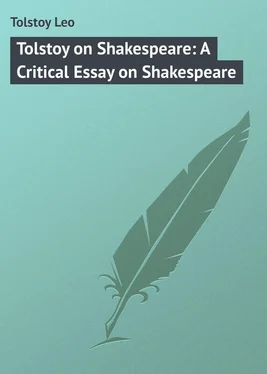Leo Tolstoy - Tolstoy on Shakespeare - A Critical Essay on Shakespeare
Здесь есть возможность читать онлайн «Leo Tolstoy - Tolstoy on Shakespeare - A Critical Essay on Shakespeare» — ознакомительный отрывок электронной книги совершенно бесплатно, а после прочтения отрывка купить полную версию. В некоторых случаях можно слушать аудио, скачать через торрент в формате fb2 и присутствует краткое содержание. Жанр: Русская классическая проза, foreign_language, на английском языке. Описание произведения, (предисловие) а так же отзывы посетителей доступны на портале библиотеки ЛибКат.
- Название:Tolstoy on Shakespeare: A Critical Essay on Shakespeare
- Автор:
- Жанр:
- Год:неизвестен
- ISBN:нет данных
- Рейтинг книги:5 / 5. Голосов: 1
-
Избранное:Добавить в избранное
- Отзывы:
-
Ваша оценка:
- 100
- 1
- 2
- 3
- 4
- 5
Tolstoy on Shakespeare: A Critical Essay on Shakespeare: краткое содержание, описание и аннотация
Предлагаем к чтению аннотацию, описание, краткое содержание или предисловие (зависит от того, что написал сам автор книги «Tolstoy on Shakespeare: A Critical Essay on Shakespeare»). Если вы не нашли необходимую информацию о книге — напишите в комментариях, мы постараемся отыскать её.
Tolstoy on Shakespeare: A Critical Essay on Shakespeare — читать онлайн ознакомительный отрывок
Ниже представлен текст книги, разбитый по страницам. Система сохранения места последней прочитанной страницы, позволяет с удобством читать онлайн бесплатно книгу «Tolstoy on Shakespeare: A Critical Essay on Shakespeare», без необходимости каждый раз заново искать на чём Вы остановились. Поставьте закладку, и сможете в любой момент перейти на страницу, на которой закончили чтение.
Интервал:
Закладка:
The third scene is again transferred to Gloucester's castle. Gloucester tells Edmund that the French King has already landed with his troops, and intends to help Lear. Learning this, Edmund decides to accuse his father of treason in order that he may get his heritage.
The fourth scene is again on the heath in front of the hovel. Kent invites Lear into the hovel, but Lear answers that he has no reason to shelter himself from the tempest, that he does not feel it, having a tempest in his mind, called forth by the ingratitude of his daughters, which extinguishes all else. This true feeling, expressed in simple words, might elicit sympathy, but amidst the incessant, pompous raving it escapes one and loses its significance.
The hovel into which Lear is led, turns out to be the same which Edgar has entered, disguised as a madman, i. e. , naked. Edgar comes out of the hovel, and, altho all have known him, no one recognizes him, – as no one recognizes Kent, – and Edgar, Lear, and the fool begin to say senseless things which continue with interruptions for many pages. In the middle of this scene, enter Gloucester, who also does not recognize either Kent or his son Edgar, and tells them how his son Edgar wanted to kill him.
This scene is again cut short by another in Gloucester's castle, during which Edmund betrays his father and the Duke promises to avenge himself on Gloucester. Then the scene shifts back to Lear. Kent, Edgar, Gloucester, Lear, and the fool are at a farm and talking. Edgar says: "Frateretto calls me, and tells me Nero is an angler in the lake of darkness…" The fool says: "Tell me whether a madman be a gentleman or a yeoman?" Lear, having lost his mind, says that the madman is a king. The fool says no, the madman is the yeoman who has allowed his son to become a gentleman. Lear screams: "To have a thousand with red burning spirits. Come hissing in upon 'em," – while Edgar shrieks that the foul fiend bites his back. At this the fool remarks that one can not believe "in the tameness of a wolf, a horse's health, a boy's love, or a whore's oath." Then Lear imagines he is judging his daughters. "Sit thou here, most learned justicer," says he, addressing the naked Edgar; "Thou, sapient sir, sit here. Now, you she foxes." To this Edgar says: "Look where he stands and glares! Wantest thou eyes at trial, madam?" "Come o'er the bourn, Bessy, to me, – " while the fool sings:
"Her boat hath a leak
And she must not speak
Why she dares not come over to thee."
Edgar goes on in his own strain. Kent suggests that Lear should lie down, but Lear continues his imaginary trial: "Bring in their evidence," he cries. "Thou robed man of justice, take thy place," he says to Edgar, "and thou" (to the fool) "his yoke-fellow of equity, bench by his side. You are o' the commission, sit you too," addressing Kent.
"Purr, the cat is gray," shouts Edgar.
"Arraign her first, 'tis Goneril," cries Lear. "I here take my oath before this honorable assembly, she kicked the poor king, her father."
"Come hither, mistress. Is your name Goneril?" says the fool, addressing the seat.
"And here's another," cries Lear. "Stop her there! arms, arms, sword, fire! Corruption in the place! False justice, why hast thou let her 'scape?"
This raving terminates by Lear falling asleep and Gloucester persuading Kent, still without recognizing him, to carry Lear to Dover, and Kent and the fool carry off the King.
The scene is transferred to Gloucester's castle. Gloucester himself is about to be accused of treason. He is brought forward and bound. The Duke of Cornwall plucks out one of his eyes and sets his foot on it. Regan says, "One side will mock another; the other too." The Duke wishes to pluck the other out also, but some servant, for some reason, suddenly takes Gloucester's part and wounds the Duke. Regan kills the servant, who, dying, says to Gloucester that he has "one eye left to see some mischief on him." The Duke says, "Lest it see more, prevent it," and he tears out Gloucester's other eye and throws it on the ground. Here Regan says that it was Edmund who betrayed his father and then Gloucester immediately understands that he has been deceived and that Edgar did not wish to kill him.
Thus ends the third act.
The fourth act is again on the heath. Edgar, still attired as a lunatic, soliloquizes in stilted terms about the instability of fortune and the advantages of a humble lot. Then there comes to him somehow into the very place on the heath where he is, his father, the blinded Gloucester, led by an old man. In that characteristic Shakespearean language, – the chief peculiarity of which is that the thoughts are bred either by the consonance or the contrasts of words, – Gloucester also speaks about the instability of fortune. He tells the old man who leads him to leave him, but the old man points out to him that he can not see his way. Gloucester says he has no way and therefore does not require eyes . And he argues about his having stumbled when he saw , and about defects often proving commodities. "Ah! dear son Edgar," he adds, "might I but live to see thee in my touch, I'd say I had eyes again." Edgar naked, and in the character of a lunatic, hearing this, still does not disclose himself to his father. He takes the place of the aged guide and talks with his father, who does not recognize his voice, but regards him as a wandering madman. Gloucester avails himself of the opportunity to deliver himself of a witticism: "'Tis the times' plague when madmen lead the blind," and he insists on dismissing the old man, obviously not from motives which might be natural to Gloucester at that moment, but merely in order, when left alone with Edgar, to enact the later scene of the imaginary leaping from the cliff.
Notwithstanding Edgar has just seen his blinded father, and has learnt that his father repents of having banished him, he puts in utterly unnecessary interjections which Shakespeare might know, having read them in Haronet's book, but which Edgar had no means of becoming acquainted with, and above all, which it was quite unnatural for him to repeat in his present position. He says, "Five friends have been in poor Tom at once: of lust, as Obidient; Hobbididance, prince of dumbness; Mahu, of stealing; Modo, of murder; Flibbertigibbet, of mopping and mowing; who since possesses chambermaids and waiting women."
Hearing these words, Gloucester makes a present of his purse to Edgar, saying:
"That I am so wretched
Makes thee the happier; heavens, deal so still,
Let the superfluous and lust-dieted man,
That slaves your ordinance, that will not see
Because he doth not feel, feel your power quickly.
So distribution should undo excess,
And each man have enough."
Having pronounced these strange words, the blind Gloucester requests Edgar to lead him to a certain cliff overhanging the sea, and they depart.
The second scene of the fourth act takes place before the Duke of Albany's palace. Goneril is not only cruel, but also depraved. She despises her husband and discloses her love to the villain Edmund, who has inherited the title of his father Gloucester. Edmund leaves, and a conversation takes place between Goneril and her husband. The Duke of Albany, the only figure with human feelings, who had already previously been dissatisfied with his wife's treatment of her father, now resolutely takes Lear's side, but expresses his emotion in such words as to shake one's confidence in his feeling. He says that a bear would lick Lear's reverence, that if the heavens do not send their visible spirits to tame these vile offenses, humanity must prey on itself like monsters, etc.
Goneril does not listen to him, and then he begins to abuse her:
"See thyself, devil!
Proper deformity seems not in the fiend
So horrid as in woman."
Интервал:
Закладка:
Похожие книги на «Tolstoy on Shakespeare: A Critical Essay on Shakespeare»
Представляем Вашему вниманию похожие книги на «Tolstoy on Shakespeare: A Critical Essay on Shakespeare» списком для выбора. Мы отобрали схожую по названию и смыслу литературу в надежде предоставить читателям больше вариантов отыскать новые, интересные, ещё непрочитанные произведения.
Обсуждение, отзывы о книге «Tolstoy on Shakespeare: A Critical Essay on Shakespeare» и просто собственные мнения читателей. Оставьте ваши комментарии, напишите, что Вы думаете о произведении, его смысле или главных героях. Укажите что конкретно понравилось, а что нет, и почему Вы так считаете.












